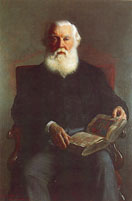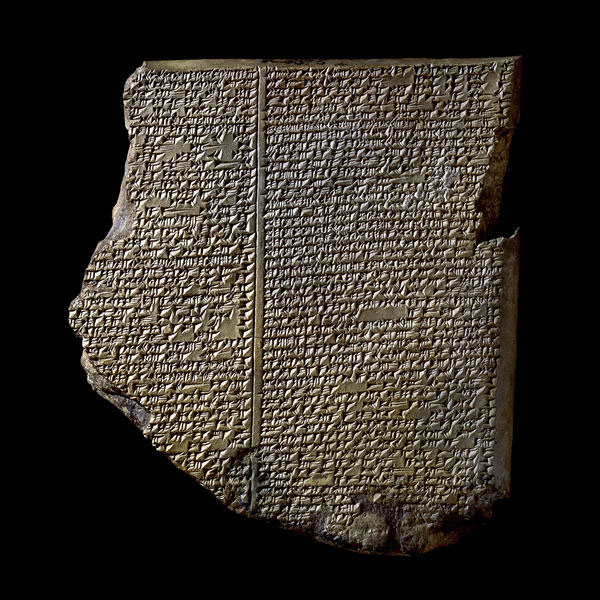|
The Rev. Frank
Logue Competing Stories: When we gather with friends and families, what do we tell one another about our lives? These are our stories. Stories are such an important part of our lives. The stories we tell help make sense of our lives. Listen at a family reunion, or even a funeral and you’ll hear lots of stories. Funny stories. Tragic stories. Stories full of the drama of daily life. One good reunion and you’ll realize how tame, or at least unrealistic Soap Operas are. The true stories are so much more gripping. However, we do not tell our stories in a vacuum. The stories we tell have competing stories. For example, your parents tell you, “You are unique and special.” The world tells you that you are not special. You are nobody. Which story do you believe? In the Gospel reading for this morning, his fellow disciples tell Thomas that Jesus has risen from the dead. These are Thomas’ good friends who have stuck together for three year on the road during Jesus’ ministry. Thomas does not believe his friends and fellow disciples. Instead, Thomas believes what the rest of the world is saying that week after Jesus’ crucifixion. Everywhere Thomas goes he hears that Jesus is dead and it’s time for everyone to get back to life as usual. This is the story Thomas believes. When faced by his friends seemingly irrational belief that Jesus’ has risen from the dead, Thomas demands proof positive saying if he doesn’t place his hands in the wounds in Jesus’ hands, feet and side, he will not believe. Thomas refuses to believe the story his fellow disciples tell about Jesus and then he names the price that must be paid for him to switch stories. With all this is mind, I want to look at our Old Testament reading for this morning. It’s the story of Noah, the dove and the rainbow. Why has Noah been on my mind this week? Probably it was the deluge of biblical proportions which swamped Camden County this week. Maybe this story was on my mind because I’ve been longing for a rainbow.
In 1872, translators had completed their work on the cuneiform and announced the remarkable similarities between these Assyrian texts and the Old Testament book of Genesis. The tablets unearthed by Layard said in part, “Pull down your
house, The story now known as the Gilgamesh Epic went on to record this story, “I built the
hulls of the ark one-hundred seventy-five wide feet high. I constructed a
top deck and six lower decks, Then I caulked
the ark with bitumen The tablets offers the briefest glimpse of life on the ark during the flood itself, “I felt the
stillness. I opened the
hatch, sunlight fell on my face. The ark ran
aground on Mount Nisir. On day seven, I released a dove which flew, but returned.”
We must acknowledge that the story of Noah and his family is not the only story of prehistoric flood that nearly wiped out all life. Many cultures preserve a tradition about a flood. But the nearest parallel to the Bible by far is the Assyrian version unearthed by Layard in the mid 1800s. Since that time, further excavations have turned up additional copies of the Gilgamesh Epic, proving this to be a very popular story between 2000 and 1000 b.c. which went through a resurgence in popularity in the 9th century b.c. reign of Ashur-nasir-pal II. In the Gilgamesh Epic, Gilgamesh is a very talented warrior who seeks immortality after the death of his friend Enkidu. Gilgamesh seeks out and finds the Utnapishtim a human who was made immortal by the gods. During the course of the story, Gilgamesh learns that the gods are capricious at best, more concerned with their own desires than the fates of humans. We discover that the gods held a council and decided to put all humans to death by a flood. Ea, the goddess of fresh water, disagreed with the plan and told Utnapishtim to build an ark and put on it specimens of every living thing. Utnapishtim did so and he and his wife survived. The divine council was furious that its death sentence was not heeded, but the gods decided to make the couple immortal so that their decree to destroy all mortals would have been followed. Utnapishtim tells Gilgamesh this story to let Gilgamesh know that he has no chance of gaining eternal life. Other than the fluke that allowed Utnapishtim and his wife to become immortal, no humans can hope to attain life after death. The Gilgamesh Epic tells at some length how the gods hold back eternal life for the divine assembly alone. The hero of the story, Gilgamesh, learns that all humans are fated to die, and the gods are unconcerned about this. For all its similarities, the Gilgamesh Epic is very different from the story of Noah. In Genesis we learn that humans are evil and God wants to wipe them out. Then we discover that God sees the good in one human family and preserves them. Then after the flood, God decides never to destroy the creation in that way again. Noah’s Ark is primarily a story about God’s love overcoming the need for justice. The rainbow is a sign of hope, hope that the Gilgamesh Epic does not share. Lawrence Boadt[1] put it succinctly,
I know this might all be a bit much to take in if you have never heard of the Gilgamesh Epic. You’ve probably never heard a sermon on it before. This is mostly because, some things are better taught than preached. Better explained when we not only have more time, but have the time for question and answer time to follow. But, what I am saying is not entirely new to you. Each of us has read of Greek and Roman myths and their stories of the gods. The Gilgamesh Epic is similar to those accounts, it just also comes quite close to the story of Noah and the Ark as it tells its tale of divine arbitrariness. The question is this, “Which story do you believe?” or perhaps, “Which story do you make your own?” Is it the story of Gilgamesh, the talented and charismatic human who learns that the gods are indifferent to humans and all who live are fated to die and be remembered no more? Or do you chose the story of Noah, which tells us that God loves us even though we mess up all the time? What if you want to pick the true story, not just the one that sounds better. How do you do that? When interpreting scripture, always compare your understanding of the story you are reading with your understanding of the whole larger story of the Bible. Noah’s Ark fits in neatly with its underlying theme of love and hope. The Gilgamesh Epic does not fit in our story. Not only that, but the story of Noah and the rainbow fits with the God I have encountered again and again in worship and prayer. Our loving God whose will can be known and whose love can be experienced. For it is your own experience of God that will reveal the core truth of the Noah story and the lie that is at the heart of the Gilgamesh’s legend. This is just one example of a competing story. You’ll hear them all the time. Like when co-workers, one-time friends and even family can make you feel worthless, but there is that competing story from the Bible where God looks at you and says that you are very good. Or you may be doing something that you know is wrong. You know that you are not living as God intends and yet the world tells you it is fine. You made need to hear God’s voice telling you to change. God’s voice recalling you to a Christ-like life. There are many opportunities to decide whether to believe what God is telling you or what the world is telling you. Bring your fears, anxieties and doubts to God. Let God know that you are not sure who to believe. Challenge God with your questions, your concerns. After all, those questions are the signs of an active faith. Give your fears and anxiety to God. Then be open to God’s answer. God will tell you which story is the true story. I have seen God do this many times usually in unlikely ways as God confirms the truth of scripture through others, often without them knowing the role they are playing in your faith story. Open yourself to God. Allow God to tell you the story of your life. Listen as God affirms what is good and what is true, and let go of those competing stories that drain life rather than give it. Amen. [1] Lawrence Boadt’s Reading the Old Testament: An Introduction from Paulist Press, page 128.
|



 The Babylonians believed in a
mysterious tension between gods and humans which often broke out in divine
anger or apparently wrathful actions because humanity annoyed the gods or
disturbed their peace. They felt a great deal of uncertainty about what the
gods wanted and what would please them. Israel, in contrast, affirms a god
who is always the same, always faithful, always just and always loving
toward the creatures he has made. He punishes only for clear moral evil and
he is quick to forgive. Both versions struggle with how humans relate to
god, but Israel rejects any sense of a moody, petulant god and describes a
God whose will can be known and his way lived and his blessing fulfilled.
The Babylonians believed in a
mysterious tension between gods and humans which often broke out in divine
anger or apparently wrathful actions because humanity annoyed the gods or
disturbed their peace. They felt a great deal of uncertainty about what the
gods wanted and what would please them. Israel, in contrast, affirms a god
who is always the same, always faithful, always just and always loving
toward the creatures he has made. He punishes only for clear moral evil and
he is quick to forgive. Both versions struggle with how humans relate to
god, but Israel rejects any sense of a moody, petulant god and describes a
God whose will can be known and his way lived and his blessing fulfilled. 